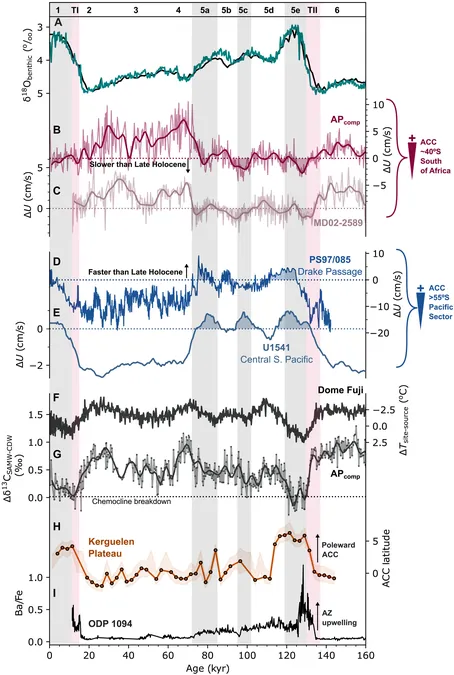
Are We on the Brink of a Climate Catastrophe? New Study Reveals Disturbing Shift in Southern Ocean Currents!
2025-01-06
Author: Arjun
Introduction
A groundbreaking study has revealed that human-induced climate change is triggering significant alterations in the Southern Ocean’s currents, reminiscent of trends observed during past ice ages and warmer periods throughout Earth's history.
Researchers from an international team, spearheaded by experts from Cardiff University, have issued a stark warning: the patterns we are witnessing today may mirror events that led to catastrophic climate shifts in the past.
The Role of the Southern Ocean
The research sheds light on the critical role played by the Antarctic Circumpolar Current (ACC) in regulating Southern Ocean dynamics, alongside global climate patterns over the last 1.5 million years.
The findings highlight how the southward migration of the westerly winds and the ACC during previous global warming events resulted in substantial natural carbon emissions into the atmosphere from the Southern Ocean.
Key Findings of the Study
Published in the peer-reviewed journal *Science Advances*, this study provides essential insights into the movement of heat, salt, and carbon-rich waters, filling a significant void in our understanding of ocean circulation and its relationship with both historical and prospective climate changes.
Dr. Aidan Starr, the study's lead author, emphasized, "The intricate interplay between ocean currents and climate patterns is crucial for comprehending present-day challenges. Our work illustrates how deeply interconnected these systems are and underscores the urgent need for climate action."
Impact of the Southern Ocean on Carbon Dioxide
The Southern Ocean is pivotal in the global absorption of carbon dioxide, accounting for approximately 40% of annual global CO2 emissions sequestered by the oceans.
This profound impact is largely due to the region's unique oceanic upwelling and circulation characteristics.
Insights from Marine Sediments
Significant breakthroughs in the study were made by analyzing marine sediments retrieved during the International Ocean Drilling Program's Expedition 361.
Researchers uncovered systematic variations in the ACC’s strength and position during glacial periods, characterized by vast ice sheets, and interglacial periods, when temperatures were warmer and ice sheets were significantly reduced.
Changes during Warmer Climatic Intervals
Interestingly, during warmer climatic intervals, termed super-interglacials, the mid-latitude ACC displayed a slowdown, while currents in the high-latitude Drake Passage, where the Atlantic and Pacific Oceans converge, intensified.
This shift signals a critical reassessment of how the Southern Hemisphere's westerly winds behave, especially concerning their implications for heating and carbon absorption in the Southern Ocean.
Urgent Call for Climate Action
Dr. Starr, now at the University of Cambridge, stated, "The necessity for all-encompassing climate action has never been more pressing. The delicate balance present in oceanic systems can easily be disrupted, leading to dire consequences.”
Conclusion
One astonishing element of the research involved examining how ACC circulation interacts with the upwelling of carbon-rich waters.
By analyzing carbon isotopes in marine organisms, the team was able to illustrate how shifts in the ACC align with significant upwelling events around Antarctica.
Co-author Professor Ian Hall from Cardiff University highlighted the importance of paleoclimate data in understanding the intricacies of climate dynamics.
“The historical data unveils a previously overlooked connection between the Antarctic Ice Sheet's retreat and the ACC's organization,” he explained.
“This relationship could activate feedback mechanisms that exacerbate climate issues should the current ice sheets continue to melt. Such disruptions in ocean circulation could have widespread repercussions impacting global climate patterns.”
As the consequences of climate change become increasingly tangible, it’s imperative that we heed these warnings and advocate for immediate, effective climate action. The fate of our planet hangs in the balance. Will we act before it’s too late?

 Brasil (PT)
Brasil (PT)
 Canada (EN)
Canada (EN)
 Chile (ES)
Chile (ES)
 Česko (CS)
Česko (CS)
 대한민국 (KO)
대한민국 (KO)
 España (ES)
España (ES)
 France (FR)
France (FR)
 Hong Kong (EN)
Hong Kong (EN)
 Italia (IT)
Italia (IT)
 日本 (JA)
日本 (JA)
 Magyarország (HU)
Magyarország (HU)
 Norge (NO)
Norge (NO)
 Polska (PL)
Polska (PL)
 Schweiz (DE)
Schweiz (DE)
 Singapore (EN)
Singapore (EN)
 Sverige (SV)
Sverige (SV)
 Suomi (FI)
Suomi (FI)
 Türkiye (TR)
Türkiye (TR)
 الإمارات العربية المتحدة (AR)
الإمارات العربية المتحدة (AR)